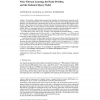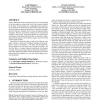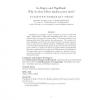1561 search results - page 270 / 313 » Probability Theory on IF Events |
142
click to vote
STOC
2000
ACM
15 years 4 months ago
2000
ACM
We describe a slightly subexponential time algorithm for learning parity functions in the presence of random classification noise, a problem closely related to several cryptograph...
ATAL
2006
Springer
15 years 3 months ago
2006
Springer
This paper focuses on the Noisy Iterated Prisoner's Dilemma, a version of the Iterated Prisoner's Dilemma (IPD) in which there is a nonzero probability that a "coop...
ATAL
2008
Springer
15 years 1 months ago
2008
Springer
In many multiagent settings, each agent's goal is to come out ahead of the other agents on some metric, such as the currency obtained by the agent. In such settings, it is no...
CORR
2007
Springer
14 years 12 months ago
2007
Springer
abstract such additional information as network annotations. We introduce a network topology modeling framework that treats annotations as an extended correlation profile of a net...
119
click to vote
IM
2007
14 years 11 months ago
2007
PageRank is a popularity measure designed by Google to rank Web pages. Experiments confirm that PageRank values obey a power law with the same exponent as In-Degree values. This ...



